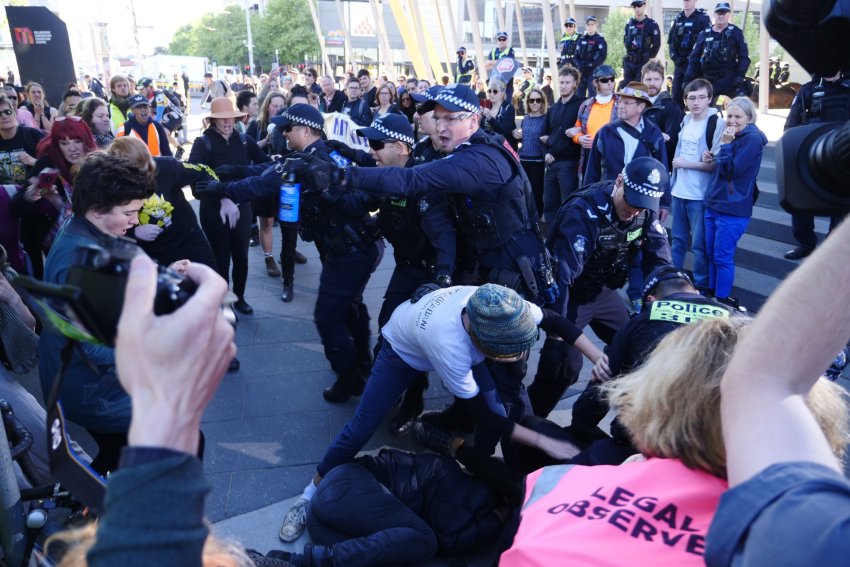
The widely-shared video of the police murder of George Floyd in the United States has led to calls to re-examine the role of police, both in the US and here.
Trades Halls in Victoria, as well as other states, have long included representatives of police officers. Warriors of Aboriginal Resistance (WAR), alongside nearly 2000 community activists, workers, unionists and students, have signed an open letter calling for the Police Association of Victoria (PAV) to be disaffiliated. Such a move would “stand in solidarity with Black people” and “build strength with all working-class people”, the letter said.
Historically, the police were formed to repress workers and their associations. As US sociology professor Alex Vitale notes in The End of Policing, police in the Southern states of the US grew out of patrols seeking to capture liberated slaves, while Northern police were sent in to quash immigrant-led labour strikes.
Police forces in Australia also have a long history of suppressing labour militancy and mass resistance, alongside perpetuating cruelty against First Nations peoples.
Colonial police were primarily responsible for the more than 311 known massacres conducted against Aboriginal and Torres Strait Islander peoples from invasion until 1930. All vile, and closely matching modern definitions of genocide, one of the most shocking was the 1926 Forrest River massacre. On that occasion, Western Australia police killed about 20 Aboriginal people and burnt their bodies in “makeshift ovens”.
The 1894 shearers’ strike was broken up by police, as was the 1929 Rothbury riot, when officers shot at 50 striking miners, killing one.
More recently, Victoria Police was described by activists as “setting a tone of violence” at last November’s otherwise peaceful protests outside the International Mining and Resources Conference in Melbourne. During these demonstrations against some of the largest fossil fuel corporations, police routinely assaulted, pepper-sprayed and horse-rammed protesters who were calling for real action on the climate.
Police unions are being challenged, not just as a result of their members’ actions, but also because of their role in stifling criminal justice. Police unions in the US are using their influence to prevent meaningful investigations of police conduct: one example is when 54 Buffalo police officers resigned after a colleague was reprimanded for pushing over a 75-year-old man onto the road during a Black Lives Matter protest.
Police have a record of supporting the strengthening of laws that disproportionately target and criminalise vulnerable groups, and which do not lower crime.
For example, the PAV continues to oppose safe-injecting rooms, insisting that the “war on drugs” is working, when it criminalises those who are least able to change their behaviour rather than those profiteering from the drug trade. The PAV similarly supports draconian bail laws, asserting that more accused people be remanded in jail before court, thereby undermining the presumption of innocence.
Police and governments’ insistence on a punitive, rather than an evidence-based, approach fuels police aggression and violence. Whether arresting Stop Adani protesters, or striking Amazon workers, police are always deployed to protect capitalists’ profits and private property.
Meanwhile, those responsible for corporate crimes against working people, such as bank CEOs’ scandalous financial misconduct, as revealed by the banking royal commission, or the estimated $1.35 billion stolen from Australian workers through wage theft each year, receive little, if any, punishment.
What separates police associations from unions is that the latter do not organise to intimidate members of the public. Unions organise to challenge unequal power in the workplace, not reinforce them.
On June 17, the King County Labour Council in Washington, a peak body representing more than 150 unions, expelled the Seattle Police Officers Guild. It came as support for the BLM movement against police brutality and racism continues to grow across the country.
The resolution proclaimed that the council is committed to anti-racism and, after debate, more than 45,000 delegates voted in support of a resolution that said that the killings “are not the result of a few ‘bad actors’”, but that the police “are over-armed with weapons”. It also said that “Labor [unions] can play a critical role, along with community and our elected leaders, in redefining the role of law enforcement in our society”.
Whether the PAV will be expelled from Victorian Trades Hall remains to be seen. What is certain, however, is that the rise in consciousness about the numbers of Black deaths in custody in this country makes the labour movement’s passive inclusion of police “unions” increasingly difficult to justify.